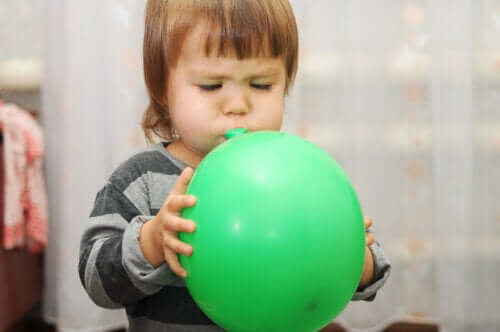17 Tips for Stimulating Language in Children


Written and verified by the psychologist Mara Amor López
Children acquire language naturally from the time they’re very small thanks to social interactions with their environment. However, sometimes stimulating language in children becomes necessary given difficulties that arise. For example, a lack of vocabulary or pronunciation issues.
The evolutive process of language acquisition follows each child’s own rhythm. Not all children are alike, nor do they acquire language at the same age. It’s important to understand that every child develops at their own pace.
The proper pronunciation and articulation of sounds depend greatly on a child’s parents. Unless, of course, the child suffers from a physical problem that impedes them. So, what responsibility do parents have? We need to offer correct models of pronunciation. With all of this in mind, we want to offer 17 tips for stimulating language in children. Keep reading.
Tips for stimulating language in children
Talk to your children often
You can ask your children about their tastes, friends, favorite activities, the clothes they’re wearing, etc… There’s an infinity of subjects that we can talk about to promote language acquisition!

Stimulate conversations
With the visual support of books and photos, you can review basic concepts with your children.
Increase their vocabulary
Show your children different objects and tell them the name of each. At the same time, describe the objects by naming their characteristics, shape, color, etc.
Tell stories
This activity is very motivating for children. You can make sounds, gestures, noises, etc., as you read the story. And when you finish reading, ask them easy questions about the story’s content.
Take advantage of every occasion
Every occasion is a good opportunity to promote the development of language in children. A trip, household tasks, looking at your child’s closet or the furniture in his or her room, the colors of different objects… And you should always get down on your child’s level when you talk.
Play games for stimulating language in children
You can stimulate oral expression through simple games such as I spy. Or you can organize a treasure hunt by hiding objects around the house and providing clues so your child can find them. Any game you can come up with where your child needs to produce or process language is beneficial.
Express joy and enthusiasm
It’s important that, even though things don’t always go well, the effort that children put into the activities they carry out is also important. Be sure to show you’re happy and proud of your kids.
Don’t overprotect your kids
If you overprotect your kids, then you’re not allowing their personality to develop completely. You should give them autonomy and, as much as possible, allow them to be the ones that navigate their activities.
Always be sure to listen to your children
To stimulate language in children, it’s crucial that you listen attentively and try to respond with questions. That way, you’ll encourage your child to continue speaking and make communication a pleasant experience.
Play games that involve blowing
Games like blowing up balloons, sipping through straws, blowing on whistles, or imitating noises and animal sounds all help exercise mouth mobility.

More tips for stimulating language in children
Imitate in order to teach pronunciation
Children learn a great deal through imitation. For that reason, when you talk with them, do so slowly, using correct pronunciation and without shouting. Don’t ignore your children when they want to talk to you, and make sure not to reinforce any mistakes they make when expressing themselves.
Reward your children when they speak correctly
It’s important to correct your children when they make mistakes, but be sure not to criticize them, laugh at them, or get angry. At the same time, avoid making comparisons with other children, siblings, cousins, classmates, etc.
Don’t interrupt kids when they’re talking
It’s never a good idea to cut children off when they’re speaking and tell them to start over again.
Don’t use infantile language when talking to your children
Children use infantile language because they’re still in an early stage in the process of language acquisition. If you imitate them, you’ll be delaying and slowing down the process that will eventually lead to correct pronunciation.
Don’t answer for your children
When you ask your children questions, it’s important to do so in a way that answering requires more than just “yes” or “no.” For example, don’t just ask your children if they want a banana. Rather, you can ask, “Do you want a banana or an orange?”

Don’t imitate your child
Even if you find the way that your little one speaks to be amusing, you shouldn’t imitate their pronunciation mistakes. You’ll only be reinforcing the habit.
Don’t cut off the ends of words
Make sure to finish all of your words without cutting off their endings. At the same time, if your children do this, make sure to correct them so their learning and language acquisition will be adequate.
Final thoughts about stimulating language in children
These are just a few of the many ways that you can stimulate language in children. If you apply them, you’ll be sure to observe improvements in their language development. Of course, if your child doesn’t have a physical problem that impedes correct pronunciation.
The tips we mentioned above aren’t meant to take the place of a speech therapist if your child needs one. It depends on each child’s particular situation and the problems he or she has.
Children acquire language naturally from the time they’re very small thanks to social interactions with their environment. However, sometimes stimulating language in children becomes necessary given difficulties that arise. For example, a lack of vocabulary or pronunciation issues.
The evolutive process of language acquisition follows each child’s own rhythm. Not all children are alike, nor do they acquire language at the same age. It’s important to understand that every child develops at their own pace.
The proper pronunciation and articulation of sounds depend greatly on a child’s parents. Unless, of course, the child suffers from a physical problem that impedes them. So, what responsibility do parents have? We need to offer correct models of pronunciation. With all of this in mind, we want to offer 17 tips for stimulating language in children. Keep reading.
Tips for stimulating language in children
Talk to your children often
You can ask your children about their tastes, friends, favorite activities, the clothes they’re wearing, etc… There’s an infinity of subjects that we can talk about to promote language acquisition!

Stimulate conversations
With the visual support of books and photos, you can review basic concepts with your children.
Increase their vocabulary
Show your children different objects and tell them the name of each. At the same time, describe the objects by naming their characteristics, shape, color, etc.
Tell stories
This activity is very motivating for children. You can make sounds, gestures, noises, etc., as you read the story. And when you finish reading, ask them easy questions about the story’s content.
Take advantage of every occasion
Every occasion is a good opportunity to promote the development of language in children. A trip, household tasks, looking at your child’s closet or the furniture in his or her room, the colors of different objects… And you should always get down on your child’s level when you talk.
Play games for stimulating language in children
You can stimulate oral expression through simple games such as I spy. Or you can organize a treasure hunt by hiding objects around the house and providing clues so your child can find them. Any game you can come up with where your child needs to produce or process language is beneficial.
Express joy and enthusiasm
It’s important that, even though things don’t always go well, the effort that children put into the activities they carry out is also important. Be sure to show you’re happy and proud of your kids.
Don’t overprotect your kids
If you overprotect your kids, then you’re not allowing their personality to develop completely. You should give them autonomy and, as much as possible, allow them to be the ones that navigate their activities.
Always be sure to listen to your children
To stimulate language in children, it’s crucial that you listen attentively and try to respond with questions. That way, you’ll encourage your child to continue speaking and make communication a pleasant experience.
Play games that involve blowing
Games like blowing up balloons, sipping through straws, blowing on whistles, or imitating noises and animal sounds all help exercise mouth mobility.

More tips for stimulating language in children
Imitate in order to teach pronunciation
Children learn a great deal through imitation. For that reason, when you talk with them, do so slowly, using correct pronunciation and without shouting. Don’t ignore your children when they want to talk to you, and make sure not to reinforce any mistakes they make when expressing themselves.
Reward your children when they speak correctly
It’s important to correct your children when they make mistakes, but be sure not to criticize them, laugh at them, or get angry. At the same time, avoid making comparisons with other children, siblings, cousins, classmates, etc.
Don’t interrupt kids when they’re talking
It’s never a good idea to cut children off when they’re speaking and tell them to start over again.
Don’t use infantile language when talking to your children
Children use infantile language because they’re still in an early stage in the process of language acquisition. If you imitate them, you’ll be delaying and slowing down the process that will eventually lead to correct pronunciation.
Don’t answer for your children
When you ask your children questions, it’s important to do so in a way that answering requires more than just “yes” or “no.” For example, don’t just ask your children if they want a banana. Rather, you can ask, “Do you want a banana or an orange?”

Don’t imitate your child
Even if you find the way that your little one speaks to be amusing, you shouldn’t imitate their pronunciation mistakes. You’ll only be reinforcing the habit.
Don’t cut off the ends of words
Make sure to finish all of your words without cutting off their endings. At the same time, if your children do this, make sure to correct them so their learning and language acquisition will be adequate.
Final thoughts about stimulating language in children
These are just a few of the many ways that you can stimulate language in children. If you apply them, you’ll be sure to observe improvements in their language development. Of course, if your child doesn’t have a physical problem that impedes correct pronunciation.
The tips we mentioned above aren’t meant to take the place of a speech therapist if your child needs one. It depends on each child’s particular situation and the problems he or she has.
This text is provided for informational purposes only and does not replace consultation with a professional. If in doubt, consult your specialist.








